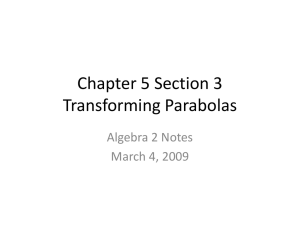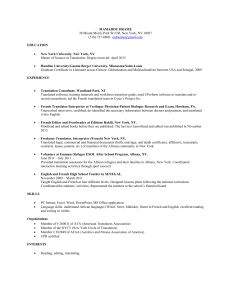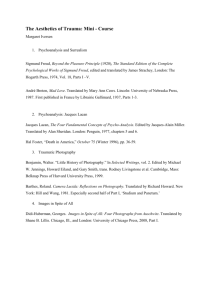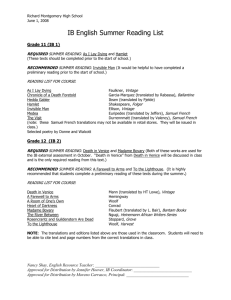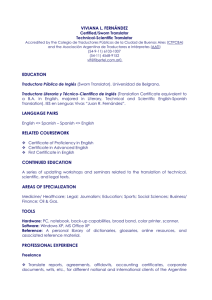THALIA PANDIRI In This Issue
advertisement
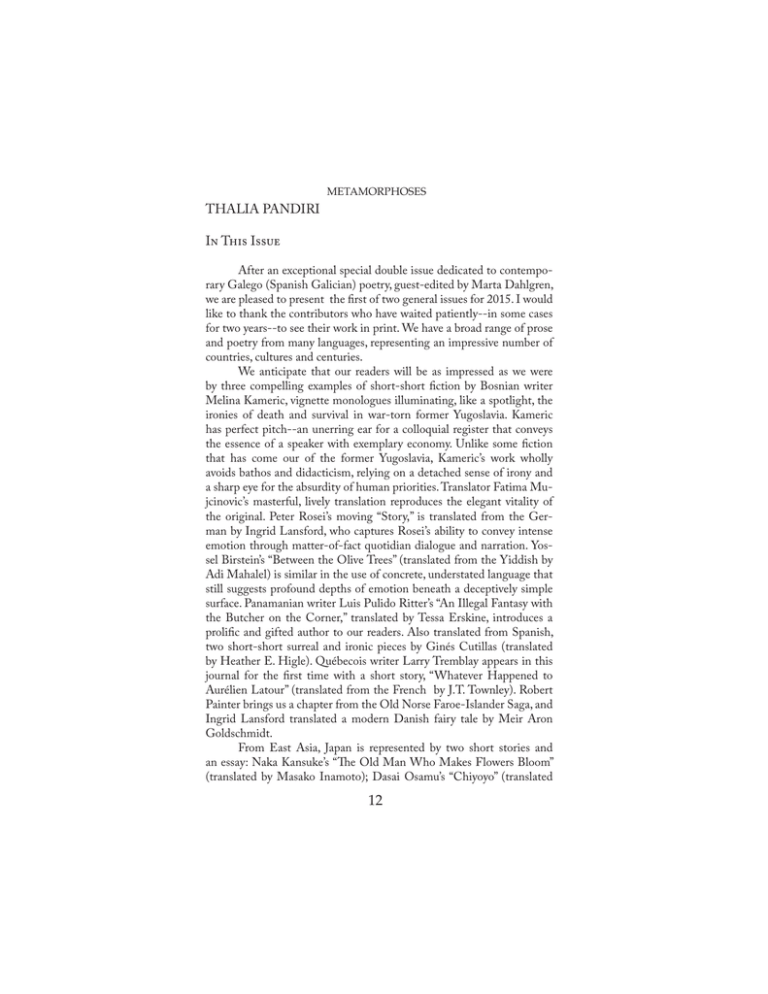
!"#$!%&'(%)") THALIA PANDIRI In This Issue After an exceptional special double issue dedicated to contemporary Galego (Spanish Galician) poetry, guest-edited by Marta Dahlgren, we are pleased to present the first of two general issues for 2015. I would like to thank the contributors who have waited patiently--in some cases for two years--to see their work in print. We have a broad range of prose and poetry from many languages, representing an impressive number of countries, cultures and centuries. We anticipate that our readers will be as impressed as we were by three compelling examples of short-short fiction by Bosnian writer Melina Kameric, vignette monologues illuminating, like a spotlight, the ironies of death and survival in war-torn former Yugoslavia. Kameric has perfect pitch--an unerring ear for a colloquial register that conveys the essence of a speaker with exemplary economy. Unlike some fiction that has come our of the former Yugoslavia, Kameric’s work wholly avoids bathos and didacticism, relying on a detached sense of irony and a sharp eye for the absurdity of human priorities. Translator Fatima Mujcinovic’s masterful, lively translation reproduces the elegant vitality of the original. Peter Rosei’s moving “Story,” is translated from the German by Ingrid Lansford, who captures Rosei’s ability to convey intense emotion through matter-of-fact quotidian dialogue and narration. Yossel Birstein’s “Between the Olive Trees” (translated from the Yiddish by Adi Mahalel) is similar in the use of concrete, understated language that still suggests profound depths of emotion beneath a deceptively simple surface. Panamanian writer Luis Pulido Ritter’s “An Illegal Fantasy with the Butcher on the Corner,” translated by Tessa Erskine, introduces a prolific and gifted author to our readers. Also translated from Spanish, two short-short surreal and ironic pieces by Ginés Cutillas (translated by Heather E. Higle). Québecois writer Larry Tremblay appears in this journal for the first time with a short story, “Whatever Happened to Aurélien Latour” (translated from the French by J.T. Townley). Robert Painter brings us a chapter from the Old Norse Faroe-Islander Saga, and Ingrid Lansford translated a modern Danish fairy tale by Meir Aron Goldschmidt. From East Asia, Japan is represented by two short stories and an essay: Naka Kansuke’s “The Old Man Who Makes Flowers Bloom” (translated by Masako Inamoto); Dasai Osamu’s “Chiyoyo” (translated !" !"#$%&'()*+ by Owen Cooney); and Tanizaki’s elegant essay “On Laziness” (translated by Jason Morgan. From Vietnam comes Nam Cao’s “Bright Moon,” translated by Quan Manh Ha. Poetry selections in this issue also include some exciting surprises. Naveed Alam presents the legendary Shah Hussain, both in translations from the Punjabi and in his own very personal, very contemporary poetry that converses with Shah Hussain across the centuries and pays homage to his style. We are happy to have a cradle song translated from the Nahuatl by David Bowles, particularly so because indigenous languages of the Americas are so rarely represented in this and other literary journals, and so seldom presented bilingually. From Spain, we offer the Catalan poet Salvador Espriu (translated by Joel Graham), as well as masterful translations by G.J. Racz of Juan del Valle y Caviedes and Garcilaso de la Vega. Translations of Old French include poetry by the very well-known François Villon (tr. Samuel Danon) and the Old French trouvère known only as Mahieu le Juif (translated by Samuel Rosenberg). Award-winning translator Alexis Levitin gives us poems by Ruy Belo, translated from the Portuguese. German poetry includes work by Jürgen Becker (translated by Ingrid Lansford); Hilde Domin (translated by Mark Burrows); Henning Ahrens (translated by the team of Mark Herman and Ronnie Apter). Miltiades Matthias, a musician, offers a new translation of an early poem by Greek Nobelist George Seferis. Fresh translations of Romanian poet Zaharia Stancu are offered by the team of Arnold Johnston, Deborah Ann Percy and Dona Roşu. From Ukrainian, Steve Komarnyckyj translates a poem by Ihor Pavlyuk. Three poems by Moon Tae-Jun are translated from the Koren by Chae-Pyong Song, who passed away in 2013, and co-translator Darcy Brandel, who has written a tribute to Chae-Pyong Song in this issue. Finally, we are delighted to have a quirky poem from contemporary Chinese poet Potato Brother (the pseudonym of Yu Kuichao), translated by Josh Stenberg. Two very different plays round out the issue: a one-act interlude (1792) by 18th-century playwright Francisco De Castro (published here bilingually, translated from the Spanish by Glenda Y. Nieto Cuebas and German E. Vargas Ramos), and a Swiss-French piece by Isabelle Sbrissa, whose characters are Ken, Barbie and their doubles. The play was first performed in 2009 and is translated here for the first time from the French, by Kiki Gounaridou and Joel Tansey, with Rosine Schautz. As translators Gounaridou and Tansey say in their introduction, this play “is an incisive comment on culture, language, identity, gender, theatrical !" !"#$!%&'(%)") presentation, and the post-modern human condition.” We are grateful for the opportunity to offer our readers a glimpse of what is new in Swiss francophone theatre, an area unfamiliar to most anglophone readers. Forthcoming The fall 2015 issue is already in preparation, and includes poetry and prose translated from Arabic, Urdu, Old English, Ancient Greek, Gascon, Danish, Finnish, Italian, German, French, Spanish, Slovene, Russian, Yiddish, Vietnamese, Chinese, Japanese, and more. 2016 will see the publication of a special guest-edited issue on contemporary Brazilian fiction. Long-range plans include a guest-edited issue dedicated to Chinese poetry and prose. Gratitude Along with board members and contributing editors, I am very grateful to our contributors, to all the rights holders who have given us permission to publish original texts and translations, and especially to the many anonymous peer reviewers without whose expertise in a very wide range of languages and literatures we could not maintain the standards in which METAMORPHOSES has always believed fervently. While we recognize that there are many ways to approach translation, and that at times a translation that is far from literal can still be “faithful” to the original, we look carefully at the source language text as well as the translation. Some literary journals take a more belletristic approach: if it sounds good in English, no one seems to know or care if the English version bears any resemblance to what it purports to translate. We rely on the generosity of our (unpaid and perforce anonymous) peer reviewers to whom we owe an enormous debt of gratitude. Thanks are due to our subscribers, institutional and individual, as well as to Five Colleges Inc., Amherst College, Hampshire College, Mount Holyoke College, Smith College, The University of Massachusetts Amherst, and the Translation Center at The University of Massachusetts Amherst for their continued support. I would especially like to thank the wonderful young women who have worked closely with me in the development and production of this issue: Erica Zhang, who has moved on to work in the publishing field but who is still willing to mentor new interns by email; Rachel Brenner, who continued Erica’s work in the summer of 2013; Rebecca Lee, who !" !"#$%&'()*+ worked with me as a sophomore and has returned to METAMORPHOSES as a senior. Thank you also to Yvie (Mengying) Yao, who is a quick study when it comes to technology as well as being expert in Chinese and Arabic. Finally, for her support in managing business aspects of keeping a journal solvent, and for so graciously and generously offering her time and expertise, I am thankful to Chrissie Bell, whose efficiency is breath-taking. !"
